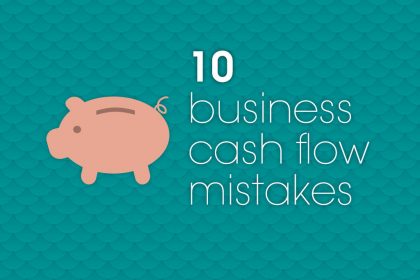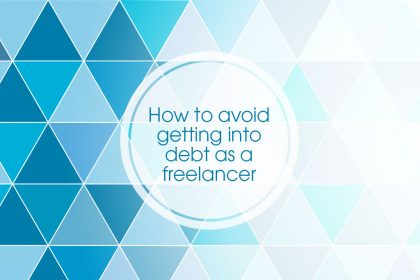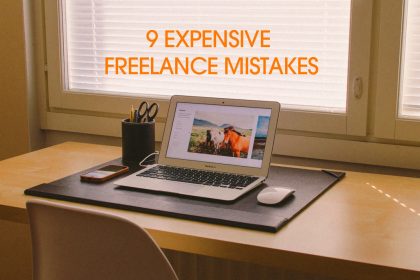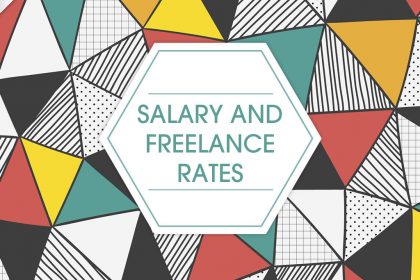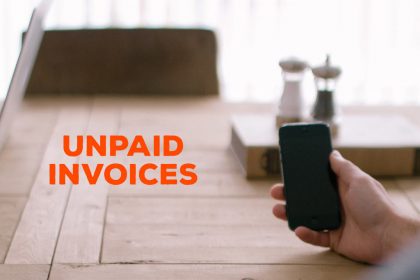Are you afraid to charge what you’re worth?
Are you happy with the amount your business or freelance clients and customers are paying for your products and services? Or are you afraid to charge your full worth?
We already know that female employees often earn less than their male colleagues, from graduates right through to company directors. (Find out how to ask for a pay rise – and get it!) But what about in the business or freelance world?
Are female entrepreneurs and freelancers any better at stating their worth – and getting it? Or, just like in our offices, are we accepting less than we think we should be getting?
Are you charging too little for your work?
A quick survey of my female friends shows that we often charge too little for our work.
A couple of days ago, I had coffee with a friend. And not just any friend – this was the friend that prompted me to write our most popular article ever, Three words you should never use to describe your work or business.
As you may recall, this friend has a successful baking business, with both corporate and private clients. But over coffee and brownies two days ago, she explained that she had a problem – she’s not charging enough.
You see, cakes are expensive. The ingredients cost a lot of money, you need to factor in overheads such as the cost of cooking and packaging, and they take a lot of time to produce, especially if they involve detailed decoration.
But as customers, we don’t always know this. We don’t know how much money cakes cost to make, and don’t see the amount of work that goes into them. So when we find out the price, it can seem a lot of money to pay for a cake.
So my friend admits that when she’s often too embarrassed to quote her full price to one-off private clients, especially if she knows them or they’re a friend of a friend. And as a result she has a lot of work, but isn’t earning enough from it.
Why you NEED to charge what you’re worth
Charging what you believe is proper value for what you do or produce isn’t arrogant or just a fanciful desire – it’s essential if you want to be successful.
When you charge too little, find yourself doing extra work, or meet uncomfortable deadlines for free because you feel bad about asking for your full value, you soon become exhausted and resentful – just like my friend.
As a result, you wear yourself out for little emotional or financial reward and cease to enjoy your business.
In the short term this is disheartening and demoralising, but long term it’s toxic to your business and to yourself. Charging less than you are worth is unsustainable, and will eventually lead to your business becoming one of the one in three start ups that fail.
Learn how to charge what you’re worth
If you want to build a successful business that you enjoy working on and pays you a worthy wage, you need to confidently charge a reasonable amount for what you are doing.
To help you learn how to do that, we’ve put together some advice.
Start giving written quotes
There’s nothing more embarrassing than telling someone your price and seeing their horrified face – or hearing the phone go silent. So to avoid that awkward moment, we adjust our prices mentally in our head and offer one that we think they’ll be happy with.
Or, we quote our price and them immediately talk it down or offer extra freebies. Either way, it’s a disaster for us. We’ll earn less for our work, and make our business appear less professional.
To avoid this tricky scenario, only provide written quotes. If someone does approach you for a price, ask for their email or postal address and say you’ll send it to them shortly. If they try and badger you into even a rough figure there and then, stand firm and say you need to calculate it properly.
Make sure you have a standard, business-like form for your quotes (you can easily create these using programmes like Word) to give an air of formality.
And don’t just give a brief description and price – make sure you include everything you’re doing and they’re getting in your quote to show what good value it is.
For example, if you are, like my friend, making someone a special birthday cake, don’t just write ‘Birthday cake £90’ on the quote. Instead, list everything:
- Two 20cm round sponges made with organic eggs.
- Rolled fondant icing covering.
- Hand decoration with lettering: Happy 40th Birthday Sally!
- Six fondant characters to look like friends.
- Other miscellaneous fondant objects.
- Packaging and delivery.
By taking the emotion out of a face-to-face or over the phone conversation, you can avoid underselling yourself. And the formal invoice gives your business a more professional air – all of which makes your quote seem more acceptable.
Have a set price list
If you are valuing every order on its own merits, it’s much easier to charge people less than you should.
Instead, make sure you have a set price list. You can include, if you wish, allowances for discounts (for example, 10% off for family and close friends) but as a rule, you should stick to your price list.
Having a set list helps you to state your rates with confidence, and removes some of the risk of you blurting out a cheap rate if you feel put on the spot! Or allowing someone to haggle you down.
It may be that many of your commissions are unique, but even having price brackets or general guidelines for pricing can help you state your value with more authority and confidence.
Stop being apologetic
When you’re discussing money with a client or customer, there’s one word that you should never, ever use. And that’s ‘sorry’.
If you feel bad about asking a customer or client to pay what you’re charging, they’ll spot it. They’ll notice your lack of confidence and embarrassment and assume one or more of a number of things:
- You’re chancing your arm by charging too much.
- Your products and services aren’t worth what you want.
- You expect to get less than you’re stating.
- They can haggle you down.
So make sure that you state your prices with confidence and certainty, and never include a sorry or but in your quote.
Also don’t offer to do extra work, include freebies or make the terms of your delivery more favourable, as this will be interpreted the same way.
(It’s also been shown that if you give the impression that what you do has less value, it will be perceived that way by your customers too.)
Remember that people don’t need to buy from you
No one is pointing a gun at your customers’ or clients’ heads (we hope!) and forcing them to buy from you, and only you.
It’s easy today to find whatever products or services we need from any number of providers. And yes, you may be the best at what you do, or sell unique products, but your customers come to you by choice.
And they can just as easily choose to buy from someone else if they don’t like your prices. So don’t feel bad at asking for what you feel is a reasonable value for your work. You’re offering an optional service or products – not an essential lifeline!
How much are you willing to lose to be liked?
One of the reasons we don’t like to charge our full worth is that we want to be liked. We want our clients to walk away from an interaction with us thinking ‘Wasn’t she a nice lady?’
What we don’t want them to do is to inhale sharply when we tell them our rates and think that we’re cheeky, greedy or over-valuing the quality of our work.
But being liked comes at a high cost. Because in order to keep our clients happy, we mentally slash our rates, and charge them an amount we think they’ll like. And who doesn’t like a cheap rate?
But we’re not in business to be nice or be liked. We’re in business to do something we love, that we’re good at, and be paid good money for it.
If your rate is fair and just, then your clients will be happy to pay it. If some think it is too expensive, then let them go elsewhere – they’re not your ideal target market anyway.
Be happy to lose some customers
You’re never going to please everyone with your prices – and that’s fine. By charging what you’re worth and sticking to it, you may lose some customers along the way.
But as long as you are confident you have established reasonable prices and are not pricing yourself out of the market, or over-valuing yourself, you should find customers who are willing to pay what you are asking for.
If some customers decide to go elsewhere then they were never your ideal customer in the first place. They would never have paid what you need to charge, and would not have sustained your business.
So instead of worrying about losing them, make sure you focus your marketing and attentions on the customers who are happy to pay what you’re worth – and go and find more of them.
(Need more tips on raising your prices? You can read the complete guide to raising your freelance rates here – learn why it’s so important and how to manage your clients or customers’ reactions.)
How charging more can lead to more business not less
Over the past few months I have spoken to a number of women who have raised their prices – and found that rather than lose customers or clients, they’ve actually got more business.
One of these women was a gardener – a lovely lady who was charging far too little for her work. As a result, every year she had the same problem; when spring came she was inundated with work, and even turning away customers. But in winter, when gardens died off, so did her business and she struggled to make ends meet with her few, regular year-round clients.
Last year was a particularly hard winter. It rained for weeks on end, keeping her off work and drastically out of pocket. So she finally decided she needed to put her prices up. She rationalised that she’d maybe lose clients in the process, but she’d work less while still making the same money in winter, and in summer she’d earn more.
But she was wrong. Her regular clients, who knew how good she was, were happy to pay the new rate, and she didn’t lose a single one. Even better, her new rates meant that people perceived her as a better gardener, and she was recommended for a lucrative year-round contract at a nearby stately home.
So by putting up her prices, she actually got more work, not less – and earned more from it. And it’s not just her. Time and time again I meet people – coaches, designers, crafters and more – who say that their business has unexpectedly actually grown after they raised their prices.
(Want to ask your clients for more money but don’t know how? Learn how to raise your prices here.)
Start charging your full value
So what about my friend with the baking business? After our chat, she resolved to be more firm about her prices. She took on board some of the advice in this article, and from now on will give her customers written quotes.
While it’s too soon to tell the impact this will have on her business, she feels better knowing that she can, and should, be charging her full rate.
After all, it’s much better to bake one cake a day for £90 and enjoy it, than struggle to fit three in for £120 and resent every moment.
And what about you? Are you charging enough for your work? Are you confident in stating and receiving your full worth – and enjoying the personal and financial benefit as a result? Or do you need to learn how to charge more?





